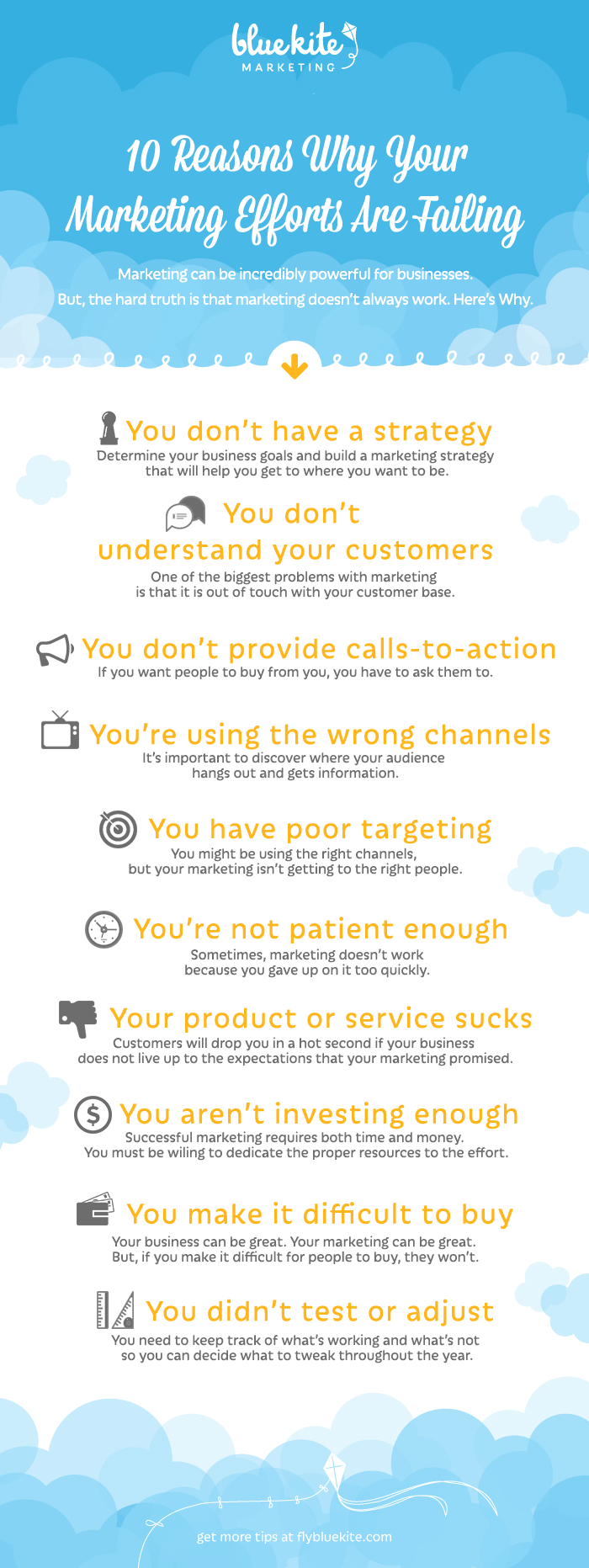Marketing can be incredibly powerful for businesses. When done right, marketing can boost awareness for your brand, position your company as the perfect solution for prospective customers and ultimately, drive leads and sales.
But, the hard truth is that marketing doesn’t always work.
Marketing is not a magic wand or silver bullet. There are plenty of ways your marketing efforts can miss the mark. But that’s not what you want to hear when you’re investing in marketing, is it?
It’s important to understand where marketing efforts can get derailed. That way, you can sidestep many of the issues that businesses encounter.
It’s early in the year and we want to make sure you start your efforts off on the right foot.
So, why are we talking about marketing failure?
Because we want to make sure you avoid these common pitfalls. If you are aware of the top reasons marketing efforts fail, you can sidestep many of the issues that businesses encounter.

Why
Marketing Efforts Fail
We want your marketing efforts to be successful this year, so we’re going to help you avoid these common pitfalls.
Certainly, there are plenty of variables as to why your marketing doesn’t work, but these are some of the biggest issues we see.
1. Lack of Strategy.
If you read this blog on a regular basis, you just knew I was going to say that, didn’t you?
The number one reason why your marketing doesn’t work is that there is no strategy behind it.
You’re simply “doing” some marketing activities without any thought about how it fits with your overall business goals. Oftentimes, this happens when businesses get caught up in shiny object syndrome and they are constantly chasing the next big thing.
The absolute best way to achieve marketing success is to determine your business goals and build a marketing strategy that will help you get to where you want to be. Otherwise, you’re just wasting time and money on tactics that will not get you results.
2. You don’t understand your customers.
When is the last time you’ve talked to your customers?
No, really.
When is the last time you’ve picked up the phone or met them in person to really talk to your clients and understand what’s going on in their lives and businesses?
If you haven’t done that in a while, I strongly suggest you make time for it now.
One of the biggest problems with marketing is that it is out of touch with your customer base.
Either you don’t really know who your customers are or you have a bad understanding of their pain points and needs. It’s critical that you understand that so you can craft your marketing messaging and efforts to attract the right people or businesses.
Get to know your customers better and your marketing will improve. Trust me.
3. No calls-to-action.
When it comes to digital marketing, it’s easy to get caught up in simply “doing” social media or content marketing without a thought as to how it will help you drive leads and sales.
The same thing happens on websites. It’s amazing to me how many businesses I see without clear, obvious calls-to-action.
Jeffrey Rohrs at Salesforce just talked about this with Super Bowl ads. Very few companies had calls-to-action in their commercials during the Super Bowl.
Yes, you could argue that this was a branding play. But if you are going to spend millions of dollars on an advertisement, wouldn’t it have been better to use that investment to drive some sort of action?
There’s nothing slimey or overly salesy about that.
4. You’re using the wrong channels.
Do you know how a CB radio works? Truckers often use these to communicate with each other. But, in order to get the message, you have to turn to the right channel.
Marketing works in much the same way. If you’re business is marketing through a channel that your potential customers don’t use, they won’t get the message.
For example, if you’re spending your time tweeting but your prospects don’t hang out on Twitter, they won’t hear from you. Or, it’s like going to a tradeshow, but the attendees are not in your target audience.
See what I mean?
It’s important to discover where your audience hangs out and gets information. Do they look online? Do they use social networks? And if so, which ones? Nailing this down will help you invest your marketing efforts in the right channels.
5. Poor targeting.
Sometimes, your marketing doesn’t work because you’re targeting the wrong people or your targeting isn’t narrow enough.
You might be using the right channels, but your marketing isn’t getting to the right people. This is quite common with digital advertising.
For instance, Facebook makes it incredibly easy to “boost” your posts with some advertising dollars, but that approach isn’t very targeted. If you’re wondering why you’re not getting results with your Facebook advertising, it’s because you’re not targeting the ads to the right people.
6. You’re not patient enough.
Sometimes, marketing doesn’t work because you gave up on it too quickly.
We often tell clients that it takes six to 12 months for marketing to generate results. Yes, you will see some leading indicators of success along the way, but it takes time to really get the momentum you’re after in marketing.
That’s why perseverance in marketing is so important. Don’t give up on marketing after the first month or expect to see your money back right way. Give it some time.
7. Your product or service sucks.
I hate to break it to you, but sometimes the problem isn’t with the marketing. Sometimes, the problem is YOU.
Sure, you can have really great marketing that might get some folks in the door. But once they buy your product or experience your service, they will drop you in a hot second if your business does not live up to the expectations that your marketing promised.
And, that doesn’t just go for your product or service, it’s important to pay attention to customer service too. Sometimes, companies with a great product or service fail because their customer service is terrible.
This is where talking to your customers is so important. You need to understand if you are delivering on your company’s brand promise. If you’re not, then you must fix this first before you start focusing on your marketing.
8. You aren’t investing enough.
I’m not just talking about your marketing budget. If marketing is an afterthought at your organization or your team isn’t contributing to your marketing efforts, you’re going to have a tough time achieving results.
Successful marketing requires both time and money. You must be wiling to dedicate the proper resources to the effort.
And yes, sometimes, your marketing budget is too small. For instance, if you want your pay-per-click ads to show up on certain keywords, you might have to spend more to get the visibility and click-through-rates you’re after.
Hoping and wishing won’t get you where you want to be. You can’t expect massive results if you’re not putting in the time and money to get there.
If you want a better website that makes the buying process simpler for your customers, you might have to invest some money to make that happen.
If marketing is a priority for your organization, you need to treat it as such and give it the necessary budget to implement the right tactics for your business.
9. You make it difficult to buy.
Your business can be great. Your marketing can be great. But, if you make it difficult for people to buy, they won’t.
How many times have you found a great product online, but didn’t purchase it because the buying process was too difficult? Or, how often have you tried to hire a company or get more information, but the process took too long?
This has happened to me more times than I can count. I’m sure you’ve experienced this too.
We live in a world where people want instant solutions to their problems. You must keep this in mind when designing your buying process.
Think about what information people need to make a decision and provide that. Then, look at ways you can remove the friction from your process so it is seamless and simple.
10. You didn’t test or adjust.
Although it’s important to have a marketing strategy, it needs to be malleable. Your marketing strategy should serve as a starting point and a guide, but you have to be willing to make adjustments along the way if your efforts aren’t working.
That’s why measurement is so important. You need to keep track of what’s working and what’s not so you can decide what to tweak throughout the year.
After all, it doesn’t make sense to keep following a plan that’s not working.
Have you ever had a marketing effort fail? If so, what was the reason?


